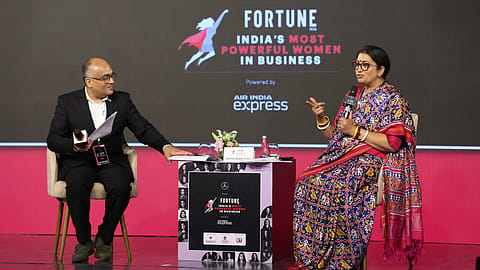India Inc not stepping up to empower women: Smriti Irani
The problem is not only of SMEs and mid-level companies, the top of the pyramid is equally unjust, says Union minister Smriti Irani

Union Minister of Women & Child Development Smriti Irani on Friday said corporate India is not stepping up to empower women even though the government has provided a framework.
Fortune India last year began work on a study backed by the ministry of women & child development, Confederation of Indian Industry (CII), Bill & Melinda Gates Foundation, SP Jain Institute of Management & Research and Karmanya Counsel to identify and recommend 'actionable solutions' to enhance women leadership in corporate India.
"What has come out of this dialogue and the white paper is that women know that companies now have a legislative framework of giving 26 weeks of maternity leave but they are scared to use it because they look upon it as an opportunity for the company to offload them," Irani says.
"We are today at a precipice of very dichotomous position where the government is providing a framework which the industry has been mulling over for years on end and it’s the industry which is not stepping up," the Union minister says, adding that the white paper is the first big step in recognising the issue.
"I believe what is alarming is that White Paper reflects on the realities of women and their positions in corporate India vis-a-vis the perspective of how they are positioned in Fortune India 500 companies. There has been for too long a presumption that SMEs or mid-level companies don't know better and that is why women don't have enhanced opportunities with regards to career advancements in such companies. The other presumption is that most Fortune 500 companies know better because they are not only erudite, they have had global experiences and they know that there is a legislative framework so that career advancement is equally distributed irrespective of gender within the company," says Irani.
"The problem is not only of SMEs and mid-level companies, the problem is that the top of the pyramid is equally unjust. Until such time we keep looking only at the bottom of the pyramid and think the top is sorted out. We will be doing great injustice to women," she adds.
What is alarming about this white paper is that there is an acceptance that the ladder is broken and the reasons for the ladder being broken are three as per the white paper, says Irani. "One, when the woman is married; second when the woman has a child and alarmingly, third, when the woman’s child sits for board exams," she explains, adding that the challenge at the bottom of the pyramid is far much greater.
Recommended Stories
Most people make an apples and oranges kind of comparison, according to the Union minister. "Look at what New Zealand is doing, look at what Sweden is doing. Look at our population. We are a country with 125 constitutionally recognised languages, 16,000 dialects, 1.4 billion people, of which 940 million will go to vote in the next 60 days. Our opportunities, our capacities and national resources are differentiated. When you look at the gender aspect you want to do apples and oranges and tell us what is good for Sweden is good for India, which is not the case," Irani says.
43% STEM graduates in India are women, says Irani, adding that number is not comparable to any other European nation. "If you look at the number of women who are doing PHDs in our country, in the past nine years that number has gone up by 99%."
Talking about start-ups, Irani says most venture capitalists are happy to fund startups which are owned and operated by men as compared to women. "So they’d rather invest in men failing than women succeeding," she says.
"If women work from home, you will leave them behind. Work from home was always a female concept till the pandemic came. Then men had to work from home, so it became acceptable," says Irani.
(INR CR)
Women work beyond the shifts that are ascribed to them, beyond the standard outcomes that are expected of them because they want to retain their jobs, says Irani. "When a woman gets an opportunity for career advancement, they negotiate contracts only so that they can have better titles at the door."